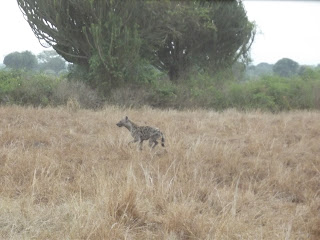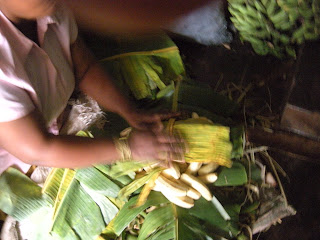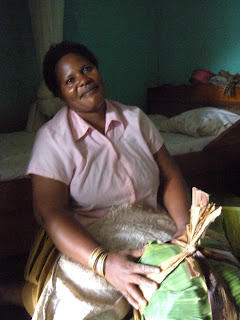I am finally home from my excursion to Western Uganda and
Rwanda. Most of it I spent sitting in a bus, but for the rest of it, I have
many stories. And a very long blog entry for you to read…
Our first stop as we drove west was at the equator. Such a prime
tourist destination, but of course we had to stop to take some pictures. That
night we got to Mbarara, which is a much smaller city than Kampala. It was much
calmer and less populated though, which felt weird since we’re all used to the
chaos of Kampala by now. The next day we
went to visit the UN headquarters of the Millennium Village Projects (MVP),
which is essentially a large development organization that works on a few villages
at a time and helps develop the village
as well as implement and provide resources that allow the village to
sustain itself as MVP eventually pulls out. There are 14 MVP villages in 10
African countries. After the introduction, we got on the bus and drove two
hours to Rujiira, where MVP is working on a village in Uganda. We walked around
and got a tour of all of the smaller projects that MVP is helping to apply such
as electricity, irrigation, medical services etc. The best part was walking
down to where the water pumps are located at the base of the mountain. It was
the first time I was completely surrounded by nature since I got to Uganda and
I was the happiest person in the world. It was absolutely beautiful being
surrounded by banana trees and fields of green! I enjoyed the visit mostly
because it was the first example of a development project that seemed to be
successful. Of course there are holes and it’s important to be a critic, but
the project gave me hope that it is possible to tackle the complex problem of
development.
The next day, we visited a refugee settlement. It was the
most moving experience of my life. The idea was that we would split our group
into smaller groups and each go to speak with a different divison of people at
the refugee settlement based on their country of origin. When we got off the bus,
we were bombarded with refugees from all different countries wanting to know
who we were, what we were doing there and how we could help them. The first
woman I talked to was Congolese and without asking, she immediately began
telling me her story of how she got there. As she spoke to me, she was crying
and it was hard to hold back my own tears. What makes the settlement, a
settlement rather than a camp is that it is not a temporary situation for the
refugees. They can buy a home and get a job there and are given land to
cultivate. This seemed to me like a good alternative to a camp, because the
settlement appeared to me like any other Ugandan village I had seen. However,
the down side is that they are hardly provided anything from the government. They’re
free in every way, but due to lack of money, most of them don’t leave the
settlement. They are given a small amount of food and water every month, but
it’s hardly enough to survive and many are unable to work and are left hungry
and homeless. They have the opportunity to apply to be relocated, but the risk
is that they be turned down and either sent back to their original country
unwillingly or turned down to remain in Uganda and risk their chances of ever
getting the change to leave.
The next man I talked to made a huge impression on my
life. He was clearly a little out of his mind, and when he approached me, he
introduced himself as “I believe”. He wore a cone hat he had made from paper,
which had some angry statements about the poor treatment of the UNHCR (United
Nations Higher Commission for Refugees) and some other things I didn’t
understand. His eyes were red (I think from being drunk) and he was no doubt
the scariest person I have ever seen. I told him my name and he began to point
out things on both mine and my friend, Jessamy’s appearance. He pointed to our
clothing and shoes and Jessamy’s painted nails and then poked our stomach’s to
indicate that they were convex. He lifted his own shirt and pointed to his
empty belly. He began accusing us angrily and in a raised voice of what we have
and where we come from and how we were intruding. I didn’t understand a lot of
what he was saying because of his accent, but I could understand the general
idea of it because of his tone and body language. As he spoke he stepped closer and closer to
me until my back was against the bus and his face was inches from mine. When he
was done with his lecture, he paused and waited for me to reply. I was so
overwhelmed that all I said was, “I don’t understand”. He replied practically
yelling at me, “I don’t need a translator. I am my own translator and you know
what I am saying to you!” At this point I couldn’t handle it anymore and I
turned and climbed into the bus, crying. My reaction surprised me, and thinking back on it,
I am glad I had that experience because it gave me such an extreme sense of
reality of this refugee settlement. At the time however, it completely shook me
up and it was hard to focus for the rest of the day. After that we separated
into small groups and I went to talk to the Rwandese. I was glad to be able to
talk to them, because I had a lot of questions about why they chose to remain
in the camp even 20 years after the genocide when the country was portrayed as
being at peace. We sat under a tree in the Rwandan section of the settlement
with our translator and waited for people to come join and speak with us. At
first we had only small children who were there just to stare at us. The adults
were reluctant to speak with us, but by the end there were about 30 adults
surrounding us. In general, the response
was that what we were hearing was just what they are portraying in the
newspapers and that they knew if they went back to their country, there was still
discrimination. They told us they no longer felt that they belonged to Rwanda,
yet they did not associate themselves with Uganda. They are just refugees.
The part that I learned the most from was at the end. He
told us the reason they were hesitant to talk to us was because they’re used to
having Americans, Canadians and Europeans come in to their settlement and ask
the refugees to speak about their stories and challenges. The refugees have
been left feeling exploited as they pour out their hearts and as a result, they
get no benefit. They see us as hope, yet they see no change to their lives.
They feel that we, as listeners, researchers or students, are their ambassadors
of change and that we should give something in return for their generosity.
This was difficult for me to hear and I have been battling with this thought
ever since. This is a difficult realization that I expect I will continue to struggle
with for the remainder of my time here. There is an inevitable hierarchy of
power and I’m finding it difficult to deal with. The book “The Uncertain
Business of Doing Good: Outsiders in Africa” by Larry Krotz talks a lot about
this issue (… I hear. As it was a required reading for this trip, maybe I
should actually read it).
The next day, we crossed the border to Rwanda. The drive was
breathtaking. As soon as we entered the country, we drove through a valley of
tea farms. When we got to Kigali, the capital city of Rwanda, I could not believe how different it was from Kampala. It was so much cleaner and more organized and there were traffic rules so it was much less chaotic. It's hard to believe how far the country has come since the genocide, but I guess that's what happens when you're under pressure.
Our stay in Rwanda was short, but filled with activities. We visited
three genocide memorials in one day. The first two were at churches just
outside Kigali and they were where a total of
about 15,000 Tutsi people took refuge and were eventually killed during the
genocide in 1994. The churches had been transformed into memorials/museums and
they displayed the clothing and other items of those who had been killed there.
One of the churches had an underground mass grave where the bones and skulls of
the people were displayed. It was really difficult to walk through the grave
with all of the open shelves of skulls facing me as if they were looking at me.
It was then that it hit me how many people were killed in the genocide. And
that was only one church! At the other church, our tour guide was a survivor of
the genocide. He was only a few years older than me, which made me realize the
reality of just how recent these events occurred. It was interesting and sad to
hear his story. Next we went to the Genocide Memorial of Kigali, which focused
mostly on the Rwandan Genocide, but also had a section of other major genocides
that have occurred throughout the world. Needless to say, it was a very
emotional day.
At the end of the day, we were all drained and speechless,
but we had one more place we wanted to see. A small group of us walked to Hotel
Mille Collines, which is the hotel that the movie Hotel Rwanda is based on. We
went to the bar by the pool and had a drink and reflected on the day together. It
was a beautiful hotel which clearly attracted the wealthiest tourists and visitors,
but it still felt a little eerie to be there. Even after my whole experience in
Rwanda, I still find it hard to wrap my head around the genocide. It still
doesn’t feel real, and I wonder if it ever will.
On a much, MUCH lighter note, the following day, we crossed
the border back to Uganda and went on TWO safaris. One was a boat safari in
Queen Elizabeth National Park on Lake Edward. We saw elephants, hippos,
crocodiles, a monkey, cape buffalo, water bucks, and a lot of cool birds. The
next morning we woke up at 5 am for an early morning “game drive”. We saw a
lion on the way to the safari grounds, which was the coolest thing ever! On the
actual game drive we saw more buffalo, wart hogs, a hyena and a lot of deer. I
have yet to see rhinos, zebras, gorillas or giraffe, but I’m working on it.
I had a great week, but I’m looking forward to two weeks
back in Kampala. We just began taking our afternoon classes at Makerere
University, where we go after our Luganda lessons. It’s cool to be on a college
campus and to be taking a class with Ugandans. I’m taking a class on Politics
and Grassroots.
If you’ve gotten this far, I thank you for staying with me
through this extremely long entry.
Pictures coming soon…



















































